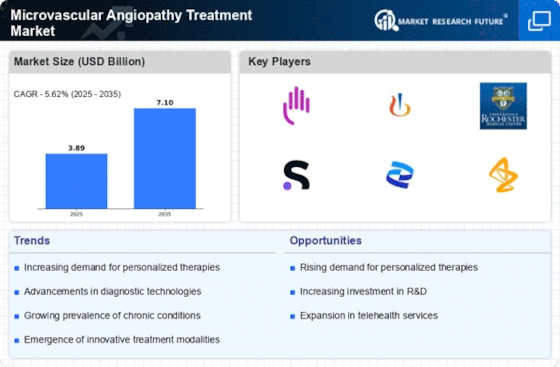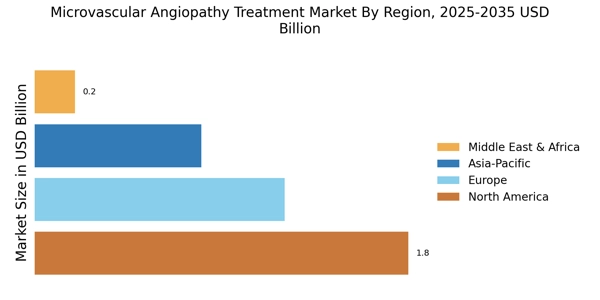Aging Population
The aging population is a significant factor influencing the Microvascular Angiopathy Treatment Market. As individuals age, they are more susceptible to chronic diseases, including diabetes and hypertension, which are closely linked to microvascular complications. The demographic shift towards an older population is expected to increase the prevalence of conditions that lead to microvascular angiopathy. By 2050, it is estimated that the number of people aged 60 and older will double, reaching 2 billion. This demographic trend suggests a growing need for effective treatment options within the Microvascular Angiopathy Treatment Market, as healthcare systems adapt to the challenges posed by an aging society.
Rising Prevalence of Diabetes
The increasing incidence of diabetes is a primary driver for the Microvascular Angiopathy Treatment Market. Diabetes is known to contribute significantly to microvascular complications, including retinopathy, nephropathy, and neuropathy. As the number of individuals diagnosed with diabetes continues to rise, the demand for effective treatment options for microvascular angiopathy is expected to grow. According to recent estimates, approximately 463 million adults are living with diabetes, a figure projected to reach 700 million by 2045. This alarming trend underscores the urgent need for innovative therapies and management strategies within the Microvascular Angiopathy Treatment Market, as healthcare systems strive to address the complications associated with diabetes.
Regulatory Support and Funding
Regulatory support and increased funding for research and development are vital drivers of the Microvascular Angiopathy Treatment Market. Governments and health organizations are recognizing the need for innovative treatments to address the rising burden of microvascular complications. Initiatives aimed at funding research projects and clinical trials are becoming more prevalent, fostering an environment conducive to innovation. Additionally, regulatory bodies are streamlining approval processes for new therapies, which may expedite the availability of novel treatments in the market. This supportive framework is likely to encourage investment in the Microvascular Angiopathy Treatment Market, ultimately benefiting patients through improved treatment options.
Growing Awareness and Education
Increased awareness and education regarding microvascular complications are driving growth in the Microvascular Angiopathy Treatment Market. Healthcare professionals and patients are becoming more informed about the risks associated with microvascular angiopathy, leading to earlier diagnosis and intervention. Campaigns aimed at educating the public about the importance of managing underlying conditions, such as hypertension and diabetes, are gaining momentum. This heightened awareness is likely to result in increased screening and treatment rates, thereby expanding the market. Furthermore, healthcare providers are focusing on training and resources to better equip themselves in managing these conditions, which could further enhance the Microvascular Angiopathy Treatment Market.
Advancements in Medical Technology
Technological advancements in medical devices and treatment methodologies are propelling the Microvascular Angiopathy Treatment Market forward. Innovations such as minimally invasive surgical techniques, advanced imaging technologies, and novel pharmacological agents are enhancing the efficacy of treatments for microvascular complications. For instance, the development of targeted therapies and biologics has shown promise in improving patient outcomes. The integration of artificial intelligence and machine learning in diagnostics and treatment planning is also gaining traction, potentially leading to more personalized and effective care. As these technologies continue to evolve, they are likely to reshape the landscape of the Microvascular Angiopathy Treatment Market, offering new avenues for intervention and management.

















